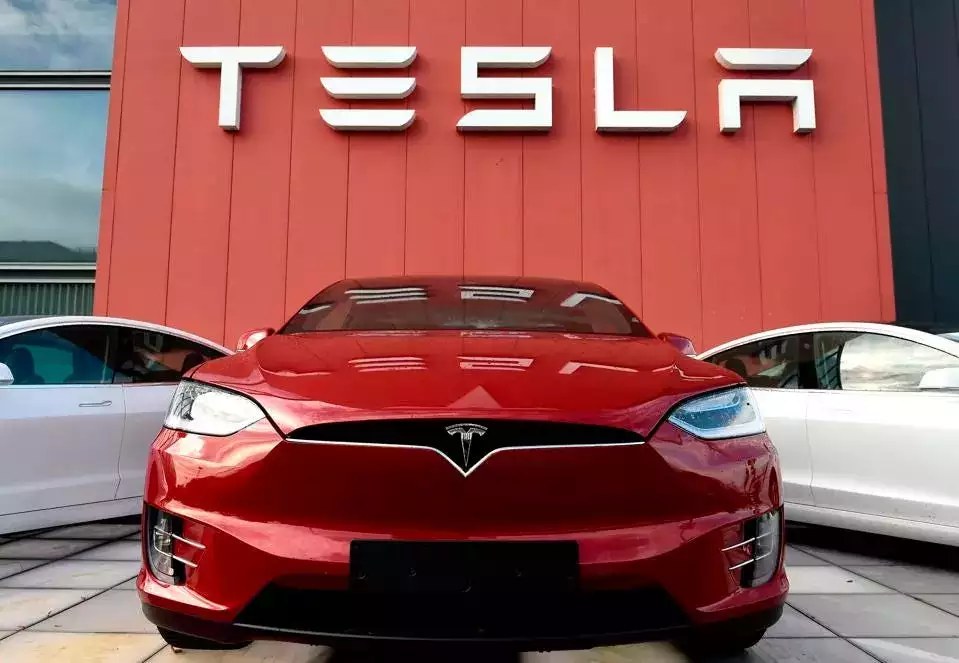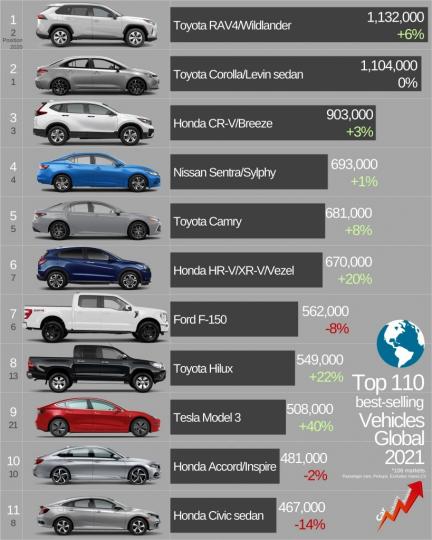Tesla stock, share price, stock price, model 3, news, car, car price, phone, pi phone, share
Read More:
Tesla, Inc American company
Tesla, Inc., formerly (2003–17) Tesla Motors, American manufacturer of electric automobiles, solar panels, and batteries for cars and home power storage. It was founded in 2003 by American entrepreneurs Martin Eberhard and Marc Tarpenning and was named after Serbian American inventor Nikola Tesla.
Read More:
Tesla, Inc is an American multinational automotive and clean energy company headquartered in Austin, Texas. Tesla designs and manufactures electric vehicles (electric cars and trucks), battery energy storage from home to grid-scale, solar panels and solar roof tiles, and related products and services. Tesla is one of the world's most valuable companies and is, as of 2022, the world's most valuable automaker. In 2021, the company had the most worldwide sales of battery electric vehicles and plug-in electric vehicles, capturing 21% of the battery-electric (purely electric) market and 14% of the plug-in market (which includes plug-in hybrids). Through its subsidiary Tesla Energy, the company develops and is a major installer of photovoltaic systems in the United States. Tesla Energy is also one of the largest global suppliers of battery energy storage systems, with 3.99 gigawatt-hours (GWh) installed in 2021.
Tesla was incorporated in July 2003 by Martin Eberhard and Marc Tarpenning as Tesla Motors. The company's name is a tribute to inventor and electrical engineer Nikola Tesla. In February 2004, via a $6.5 million investment, Elon Musk became the largest shareholder of the company. He has served as CEO since 2008. According to Musk, the purpose of Tesla is to help expedite the move to sustainable transport and energy, obtained through electric vehicles and solar power. Tesla began production of its first car model, the Roadster sports car, in 2009. This was followed by the Model S sedan in 2012, the Model X SUV in 2015, the Model 3 sedan in 2017, the Model Y crossover in 2020, and the Semi truck in 2022. The Model 3 is the all-time bestselling plug-in electric car worldwide, and, in June 2021, became the first electric car to sell 1 million units globally.Tesla’s 2022 full year deliveries were around 1.31 million vehicles, a 40% increase over the previous year, and cumulative sales totaled 3 million cars as of August 2022. In October 2021, Tesla's market capitalization reached $1 trillion, the sixth company to do so in U.S. history.
Tesla has been the subject of many lawsuits, increasing government scrutiny, journalistic criticism, and public controversies arising from statements and acts of CEO Elon Musk and from allegations of creative accounting, whistleblower retaliation, worker rights violations, and unresolved and dangerous technical problems with their products.

Read More:
Founding (2003–2004)
The company was incorporated as Tesla Motors, Inc. on July 1, 2003, by Martin Eberhard and Marc Tarpenning. Eberhard and Tarpenning served as CEO and CFO, respectively. Eberhard said he wanted to build "a car manufacturer that is also a technology company", with its core technologies as "the battery, the computer software, and the proprietary motor".
Ian Wright was Tesla's third employee, joining a few months later. In February 2004, the company raised $7.5 million in series A funding, including $6.5 million from Elon Musk, who had received $100 million from the sale of his interest in PayPal two years earlier. Musk became the chairman of the board of directors and the largest shareholder of Tesla. J. B. Straubel joined Tesla in May 2004 as chief technical officer.
Tesla Share Price
Current Stock price :- $122.40
Tesla, Inc. is an American multinational automotive and clean energy company headquartered in Austin, Texas. Tesla designs and manufactures electric vehicles, battery energy storage from home to grid-scale, solar panels and solar roof tiles, and related products and services. Tesla is one of the world's most valuable companies and is, as of 2022, the world's most valuable automaker. In 2021, the company had the most worldwide sales of battery electric vehicles and plug-in electric vehicles, capturing 21% of the battery-electric market and 14% of the plug-in market. Through its subsidiary Tesla Energy, the company develops and is a major installer of photovoltaic systems in the United States. Tesla Energy is also one of the largest global suppliers of battery energy storage systems, with 3.99 gigawatt-hours installed in 2021. Tesla was incorporated in July 2003 by Martin Eberhard and Marc Tarpenning as Tesla Motors. The company's name is a tribute to inventor and electrical engineer Nikola Tesla. In February 2004, via a $6.5 million investment, Elon Musk became the largest shareholder of the company. He has served as CEO since 2008.

Read More:
Tesla Energy Products
Tesla subsidiary Tesla Energy develops, builds, sells and installs solar energy generation systems and battery energy storage products (as well as related products and services) to residential, commercial and industrial customers.
The subsidiary was created by the merger of Tesla's existing battery energy storage products division with SolarCity, a solar energy company that Tesla acquired in 2016.
Tesla Energy's generation products include solar panels (built by other companies for Tesla), the Tesla Solar Roof (a solar shingle system) and the Tesla Solar Inverter. Other products include the Powerwall (a home energy storage device) and the Powerpack and Megapack, which are large-scale energy storage systems.Tesla Energy also develops software to allow customers to monitor and control their systems.

Read More:
Finances
For the fiscal (and calendar) year 2021, Tesla reported a net income of $5.52 billion.[11] The annual revenue was $53.8 billion, an increase of 71% over the previous fiscal year.
Of the revenue number in 2021, $314 million came from selling regulatory credits to other automakers to meet government pollution standards. That number has been a smaller percentage of revenue for multiple quarters.In Q1 2022, Tesla sold $679 million of regulatory carbon credits

Read More:
| Year | Revenue (mil. USD) |
Net income (mil. USD) |
Total assets (mil. USD) |
Employees |
|---|---|---|---|---|
| 2005 | 0 | -12 | 8 | |
| 2006 | 0 | -30 | 44 | 70 |
| 2007 | 0.073 | -78 | 34 | 268 |
| 2008 | 15 | -83 | 52 | 252 |
| 2009 | 112 | -56 | 130 | 514 |
| 2010 | 117 | -154 | 386 | 899 |
| 2011 | 204 | -254 | 713 | 1,417 |
| 2012 | 413 | -396 | 1,114 | 2,914 |
| 2013 | 2,013 | -74 | 2,417 | 5,859 |
| 2014 | 3,198 | -294 | 5,831 | 10,161 |
| 2015 | 4,046 | -889 | 8,068 | 13,058 |
| 2016 | 7,000 | -675 | 22,664 | 17,782 |
| 2017 | 11,759 | -1,962 | 28,655 | 37,543 |
| 2018 | 21,461 | -976 | 29,740 | 48,817 |
| 2019 | 24,578 | -862 | 34,309 | 48,016 |
| 2020 | 31,536 | 721 | 52,148 | 70,757 |
| 2021 | 53,823 | 5,519 | 62,131 | 99,290 |

Read More:
Tesla under Musk: Model S, Model 3, and Model Y
In 2012 Tesla stopped production of the Roadster to concentrate on its new Model S sedan, which was acclaimed by automotive critics for its performance and design. It came with three different battery options, which gave estimated ranges of 235 or 300 miles (379 or 483 km). The battery option with the highest performance gave an acceleration of 0 to 60 miles (96 km) per hour in slightly more than four seconds and a top speed of 130 miles (209 km) per hour. Unlike the Roadster, which carried its battery system at the back of the car, the Model S had its underneath the floor, which gave extra storage space in back and improved handling because of its low centre of gravity; this battery placement was used on later Tesla models. The Tesla Autopilot, a form of semiautonomous driving, was made available in 2014 on the Model S (and later on other models).
Beginning in 2012, Tesla built stations called Superchargers in the United States and Europe designed for charging batteries quickly and at no extra cost to Tesla owners. Later versions of those stations also had the capability of complete replacement of the Model S battery pack.
Tesla released the Model X, a “crossover” vehicle (i.e., a vehicle with features of a sport-utility vehicle but built on a car chassis), in 2015. The Model X had a maximum battery range of about 340 miles (547 km) and seating for up to seven.
Tesla began building large factories it called Gigafactories to produce batteries and vehicles. The first such factory opened in 2016 outside Reno, Nevada. Gigafactories were opened in Buffalo, New York, and Shanghai, China, and more Gigafactories were planned.
Because of demand for a more inexpensive vehicle, the Model 3, a four-door sedan with a range of up to 353 miles (568 km) and a price of $35,000, began production in 2017. The car had an all-glass roof, and most controls were on a 15-inch (38-cm) central touchscreen. The Model 3 became Tesla’s best-selling model and the best-selling electric car of all time, surpassing the Nissan Leaf.

Read More:
Musk joined the social media service Twitter in 2009, and, as @elonmusk, he became one of the most popular accounts on the site, with more than 85 million followers as of 2022. He expressed reservations about Tesla’s being publicly traded, and in August 2018 he made a series of tweets about taking the company private at a value of $420 per share, noting that he had “secured funding.” (The value of $420 was seen as a joking reference to April 20, a day celebrated by devotees of cannabis.) The following month the U.S. Securities and Exchange Commission (SEC) sued Musk for securities fraud, alleging that the tweets were “false and misleading.” Shortly thereafter Tesla’s board rejected the SEC’s proposed settlement, reportedly because Musk had threatened to resign. However, the news sent Tesla stock plummeting, and a harsher deal was ultimately accepted. Its terms included Musk’s stepping down as chairman for three years, though he was allowed to continue as CEO; his tweets were to be preapproved by Tesla lawyers, and fines of $20 million for both Tesla and Musk were levied.

Read More:
Partnerships
The distinguishing features of the partnership are the personal and unrestricted liability of each partner for the debts and obligations of the firm (whether the partner assented to their being incurred or not) and the right of each partner to participate in the management of the firm and to act as an agent of it in entering into legal transactions on its behalf. The civil-law systems of most continental European countries have additionally always permitted a modified form of partnership, the limited partnership (société en commandite, Kommanditgesellschaft, società in accomandita), in which one or more of the partners are liable for the firm’s debts only to the extent of the capital they contribute or agree to contribute. Such limited partners are prohibited from taking part in the management of the firm, however; if they do, they become personally liable without limit for the debts of the firm, together with the general partners. English common law refused to recognize the limited partnership, and in the United States at the beginning of the 19th century only Louisiana, which was governed by French civil law, permitted such partnerships. During the 19th century most of the states enacted legislation allowing limited partnerships to be formed, and in 1907 Great Britain adopted the limited partnership by statute, but it has not been much used there in practice. Another distinction between kinds of partnership in civil law—one that has no equivalent in Anglo-American common-law countries—is that between civil and commercial partnerships. This distinction depends on whether the purposes for which the partnership is formed fall within the list of commercial activities in the country’s commercial code. These codes always make manufacturing, dealing in, and transporting goods commercial activities, while professional and agricultural activities are always noncommercial. Consequently, a partnership of lawyers, doctors, or farmers is a civil partnership, governed exclusively by the civil code of the country concerned and untouched by its commercial code. No such distinction is made in the common-law countries, where professional and business partnerships are subject to the same rules as trading partnerships, although only partners in a trading partnership have the power to borrow on the firm’s behalf.
Read More:






